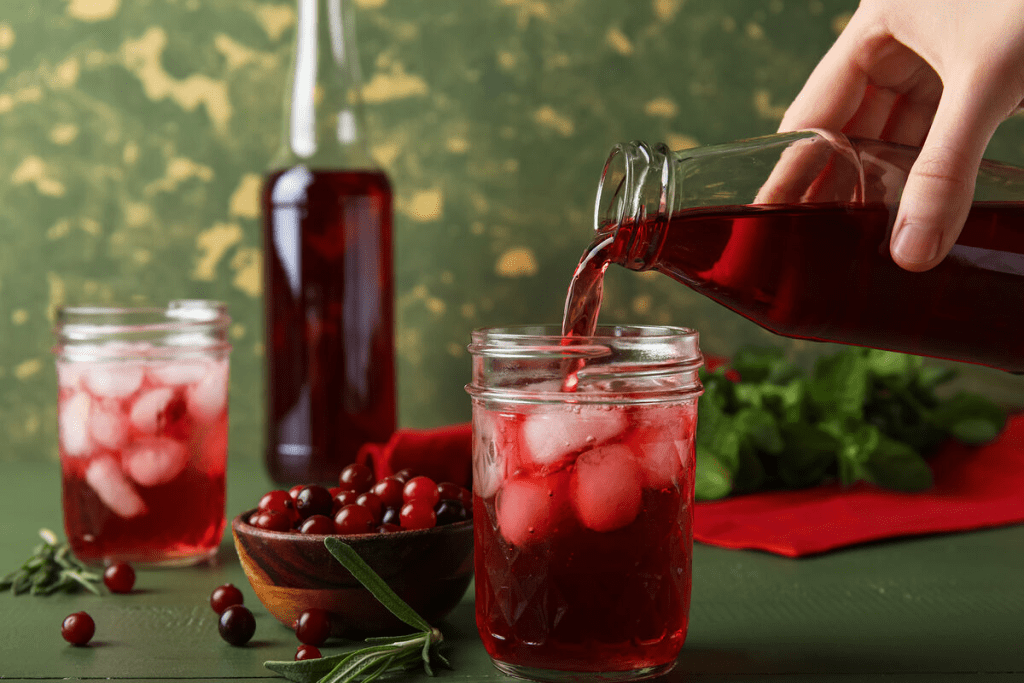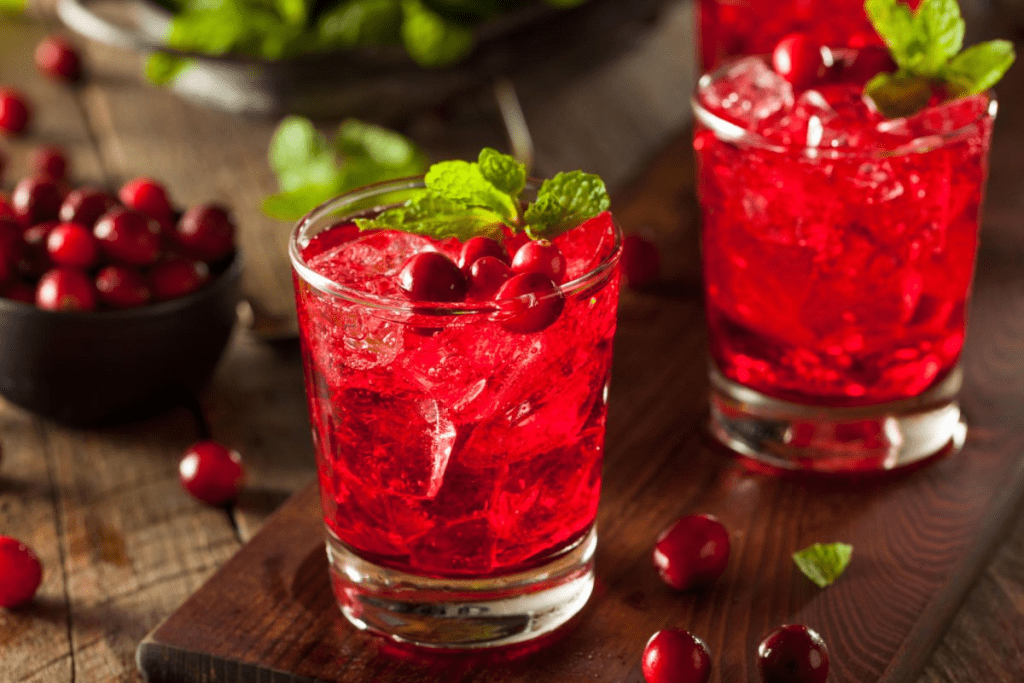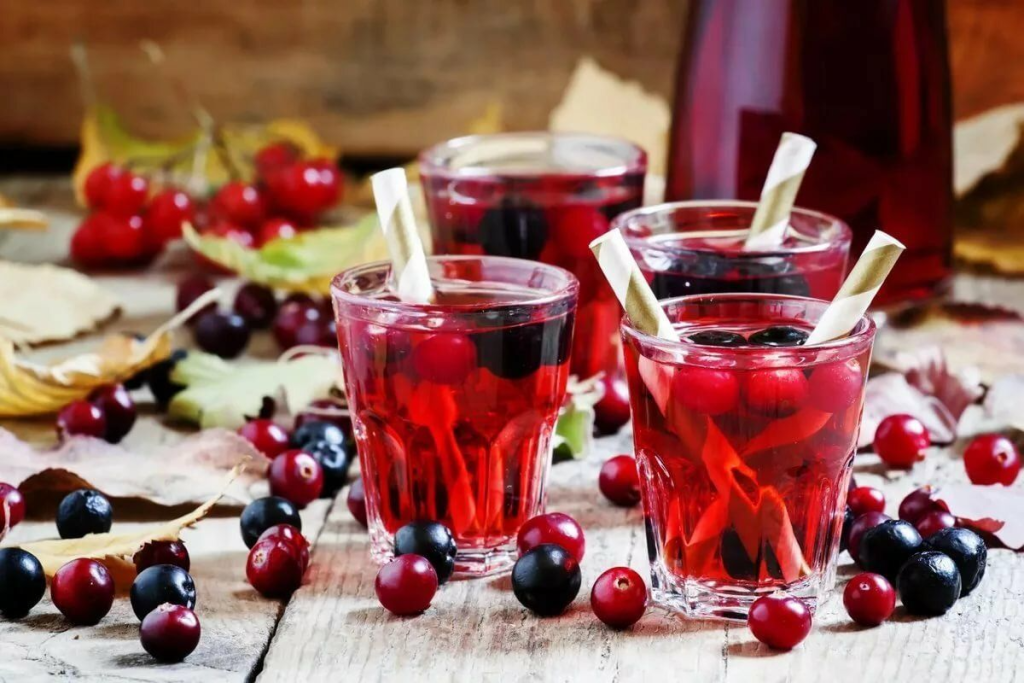
Urinary tract infections (UTIs) are common, especially among women and children. New studies show that cranberry products might help prevent them. We explore how cranberries can improve bladder health and reduce bladder irritants that often cause discomfort.
Cranberries contain A-type proanthocyanidins, compounds that may stop bacteria from sticking to the bladder wall. This can help lower UTI risk. Research also finds that cranberry products can reduce UTI cases by up to 30% in certain groups.
When considering cranberry juice and bladder health, it’s important to note how it’s consumed and its effects by age. While more research is needed, cranberry products appear to play a key role in supporting bladder function and minimizing common bladder irritants naturally.
Key Takeaways
- Cranberry products may reduce UTI risk by up to 30% in specific populations.
- A-type proanthocyanidins in cranberries may prevent bacterial adherence to the bladder wall.
- The effectiveness of cranberry products can depend on age and form.
- Cranberry juice is being studied for its possible benefits in supporting bladder health.
- Recent research highlights the possible preventive benefits of cranberry products.
The Science Behind Cranberry Juice and Bladder Health
It’s important to understand how cranberry juice affects the bladder. This juice has been studied for its role in preventing and treating urinary tract infections (UTIs). UTIs are a common problem that affects bladder health.

How Cranberry Compounds Work Against UTIs
Cranberries contain compounds that may help prevent UTIs. The main way they work is by stopping bacteria from sticking to the bladder wall. Cranberry compounds, such as proanthocyanidins, may help prevent bacteria like E. coli from adhering to the urinary tract walls, reducing infection risk.
Cranberries have unique compounds like quinic acid, malic acid, and citric acid. These work together to make it harder for bacteria to grow and stick to the urinary tract.
- Proanthocyanidins: These compounds are key in preventing bacterial adhesion.
- Quinic acid, malic acid, and citric acid: These acids help with the overall effect of cranberry juice on the urinary tract.
Is Cranberry Juice Acidic and How It Affects Your Bladder
Cranberry juice is acidic because of its citric acid. But the acidity of cranberry juice does not necessarily mean it’s acidic in the body. After digestion, it might even have an alkalizing effect.
Some worry about the acidity of cranberry juice and its impact on the bladder. While it’s acidic, most people can drink it without problems. The evidence shows it’s usually well-tolerated.
- The acidity of cranberry juice is something to think about for those with sensitive bladders.
- Drinking cranberry juice in moderation can help avoid side effects.
What the Latest Research Reveals
A 2023 meta-analysis has made big discoveries about cranberry products and UTIs. This study has shown how cranberry juice and supplements can help prevent urinary tract infections.
The 2023 Meta-Analysis: 30% Reduction in UTI Risk
The 2023 meta-analysis found that cranberry products lower UTI risk by a lot. It showed a 30% decrease in UTIs for those who took cranberry products compared to those who didn’t.
This is a big deal because it proves cranberry products can help prevent UTIs. The study combined data from many studies, making the results very reliable.

Who Benefits Most from Cranberry Products
The study found that some groups get the most benefits from cranberry products. Women with recurrent UTIs and children are the ones who can really benefit from them.
- Women with recurrent UTIs can lower their risk by drinking cranberry juice or taking supplements.
- Children, who often get UTIs, can also benefit from cranberry products as a preventive measure.
- People who have had bladder infections before should think about adding cranberry products to their diet.
It’s also key to know which foods can make UTIs worse. Some foods and drinks can irritate the bladder and raise UTI risk. Knowing which foods to avoid can help maximize the benefits of cranberry products.
Some foods to avoid include spicy foods, caffeine, and alcohol. People who often get UTIs should also watch out for foods that make you pee more at night. These can mess with sleep and make UTI symptoms worse.
The question of whether cranberry juice is a diuretic is also important. While cranberry juice isn’t a strong diuretic, it can make you pee more. But this effect is usually mild and can be managed by drinking the right amount of fluids.
Cranberry Juice and Other Bladder Irritants: What You Should Know
It’s important to know how cranberry juice affects the bladder. We should also look at other common irritants. Some foods and drinks can make bladder problems worse. Knowing what they are can help manage symptoms.
Common Foods and Drinks That Irritate the Bladder and Urethra
Some foods and drinks can irritate the bladder and urethra. This can make symptoms worse for people with urinary tract issues. Here are some examples:
- Alcohol: It’s a diuretic that can irritate the bladder.
- Coffee and Caffeinated Drinks: Caffeine increases urine production and irritates the bladder lining.
- Spicy Foods: They can cause irritation and discomfort in the urinary tract.
- Acidic Foods and Drinks: Like citrus fruits and tomatoes, which can irritate the bladder.
Does Cranberry Juice Make You Pee More?
Cranberry juice is often drunk for its benefits to urinary tract health. But, does it make you pee more? It’s not a diuretic like caffeine or alcohol. Yet, some people might notice it affects how often they pee.
The diuretic effect of cranberry juice might come from its water content. It could also irritate the bladder in some people. But research on this topic is mixed. More studies are needed to understand the link between cranberry juice and urination frequency.
In summary, cranberry juice might have benefits for the bladder. But it’s important to see it as part of a bigger diet. Knowing which foods and drinks irritate the bladder helps manage health better.
Can cranberry juice really help your bladder?
Recent studies show that cranberry juice might lower the risk of urinary tract infections (UTIs) in certain groups. We look into how cranberry juice affects bladder health. It seems that compounds in cranberries could help stop UTIs.
Cranberries have A-type proanthocyanidins, a key ingredient. It might stop bacteria from sticking to the bladder wall. Research finds that cranberry products can cut UTI risk by 30% in some groups. This makes it a natural option for those who often get UTIs.
Key Takeaways
- Cranberry juice may reduce UTI risk in specific populations.
- A-type proanthocyanidins in cranberries prevent bacterial adherence.
- Cranberry products can reduce UTI risk by 30%.
- Natural remedy for those prone to UTIs.
- Cranberry juice is a possible complementary therapy.
The Science Behind Cranberry Juice and Bladder Health
Cranberry juice has many effects on bladder health. It helps prevent bacteria from sticking to the bladder and can irritate it due to its acidity. We’ll look into how cranberry compounds stop UTIs and how its acidity affects the bladder.
How Cranberry Compounds Work Against UTIs
Cranberries have special compounds that might stop UTIs. They work by stopping bacteria from sticking to the bladder wall. Cranberry compounds, like proanthocyanidins, are key in this fight. They help keep bacteria from causing infections.
Studies show cranberry products can change how bacteria stick to the urinary tract. This is great for people who get UTIs a lot. Cranberry juice could be a natural way to avoid antibiotics.
Is Cranberry Juice Acidic and How It Affects Your Bladder
Cranberry juice is acidic because of quinic acid, malic acid, and citric acid. This acidity might help prevent UTIs but could also irritate the bladder. For some, acidic drinks like cranberry juice can make bladder problems worse.
But how cranberry juice affects bladders is different for everyone. Some people won’t have any problems, while others might feel discomfort. If you have a sensitive bladder, watch how your body reacts to cranberry juice. Start with small amounts and see how you feel.
If you find cranberry juice irritates your bladder, try diluted juice or supplements instead. This might be a better option for you.
What the Latest Research Reveals
New studies from 2023 show that cranberry products can lower UTI risk by a lot. This is based on a big study that looked at how well cranberry products work against UTIs.
30% Reduction in UTI Risk: Understanding the 2023 Meta-Analysis
The 2023 study found that cranberry products cut UTI risk by 30%. This big drop shows how good cranberry products can be. They are great for people who often get UTIs.
Key Findings:
- Significant reduction in UTI risk among participants consuming cranberry products.
- Notable benefits observed in women with recurrent UTIs and children.
- Cranberry products were found to be effective in various forms, including juice and supplements.
Who Benefits Most from Cranberry Products
Some groups get more benefits from cranberry products. Women who often get UTIs and kids are among them. For those who often get UTIs, knowing bladder infection foods to avoid is key.
Some foods and drinks can bother the bladder. These include:
- Spicy foods
- Citrus fruits and juices
- Caffeine
People often wonder if cranberry juice is a diuretic. While it might make some pee more, its effect on UTI prevention is more complex.
Also, knowing foods that make you pee more at night can help with nighttime urination issues.
By knowing the latest research and what to eat, people can make smart choices for their bladder health.
Cranberry Juice and Other Bladder Irritants: What You Should Know
Cranberry juice is often used to help with bladder health. But, other foods and drinks can also affect the bladder. It’s important to know about both the benefits of cranberry products and other foods that might irritate the bladder and urethra.
Common Foods and Drinks That Irritate the Bladder and Urethra
Some foods and drinks can make bladder irritation worse. It’s key to know which ones to avoid. Here are some common irritants:
- Alcohol: It can irritate the bladder and make you pee more.
- Coffee and Caffeinated Drinks: They can irritate the bladder and make symptoms like frequent urination worse.
- Spicy Foods: These can irritate and cause discomfort in the bladder and urethra.
- Acidic Foods: Foods like citrus fruits and tomatoes can irritate the bladder.
A study found that diet is important for bladder health. It affects the risk of urinary tract infections and bladder irritation.
Does Cranberry Juice Make You Pee More?
Cranberry juice might make you pee more often. But, the research is not clear. Some studies say it can help with urinary tract infections, which might affect how often you pee.
“The effect of cranberry juice on urine output is being studied. Some research shows it might slightly increase how often you pee.”
To keep your bladder healthy, watch what you eat and drink. Cranberry juice might be helpful, but knowing about other irritants is also important. This helps you make better food choices.
Best Forms of Cranberries for Bladder Health
When looking at cranberry options for bladder health, it’s key to know the difference between juice and supplements. These products have been studied for their role in preventing and managing urinary tract infections (UTIs) and other bladder problems.
Cranberry juice and supplements are two common choices. Each has its own benefits and drawbacks, depending on your specific needs.
Juice vs. Supplements: Sugar Content Concerns
Cranberry juice often has a lot of sugar. Many commercial juices have added sugars, which can harm your health, like if you have diabetes. Cranberry supplements, like capsules or tablets, usually have very little sugar, making them a better choice for those watching their sugar intake.
But, not all cranberry juices are the same. Some are labeled as “unsweetened” or “low-calorie.” These might be better for those who don’t want a lot of sugar. Always check the nutrition label for added sugars when picking a cranberry juice.
Who Should Avoid Cranberry Products
While cranberry products are helpful for many, some people should be careful or avoid them. Those with kidney disease or at risk of kidney stones should talk to their doctor first. This is because they might affect oxalate levels.
Also, people taking blood thinners (like warfarin) should talk to their doctor. Pregnant or breastfeeding women should also get medical advice before starting any cranberry regimen.
In summary, both cranberry juice and supplements can help with bladder health. Your choice should depend on your health needs, sugar concerns, and any interactions with medications or health conditions.
Conclusion: Should You Add Cranberries to Your Bladder Health Regimen?
Cranberry products might help lower UTI risk in some people. If you often get UTIs, adding cranberries to your routine could be good. It’s best when used with other natural remedies for an overactive bladder.
Keeping your bladder healthy means watching what you eat. A balanced diet, along with cranberry products, can help. Learning how to naturally stop bladder spasms is also key.
Before changing your bladder health plan, talk to a doctor. They can guide you on the right treatment for you. This might include cranberry products and other options.
By focusing on bladder health, you can lower UTI risk. This keeps your urinary system balanced and healthy.
FAQ
Is cranberry juice acidic and how does it affect the bladder?
Cranberry juice is acidic. But its effect on the bladder is not simple. It might irritate the bladder for some. Yet, its benefits in preventing UTIs are often greater.
How do cranberry compounds work against UTIs?
Cranberry compounds stop bacteria from sticking to the bladder and urinary tract. This makes it harder for infections to start.
Does cranberry juice make you pee more?
Yes, cranberry juice might make you pee more. But this effect is usually mild. It’s not the same for everyone.
What foods irritate the bladder and urethra?
Spicy foods, citrus fruits, tomatoes, and caffeinated drinks can irritate the bladder and urethra. Knowing and avoiding these can help with bladder issues.
Who benefits most from cranberry products?
Women with frequent UTIs and children get the most benefits from cranberry products. They can lower UTI risk by up to 30%.
Are cranberry supplements better than cranberry juice?
Cranberry supplements are a good choice for those watching sugar intake. But, pick high-quality supplements with effective extracts.
Who should avoid cranberry products?
People with kidney stones or bleeding disorders should talk to their doctor before using cranberry products. Also, those on blood thinners should be careful.
How can I manage bladder irritants and reduce UTI risk?
Avoid bladder irritants, drink plenty of water, and use cranberry products or supplements. This can help keep your bladder healthy and lower UTI risk.
Can cranberry juice help prevent UTIs?
Yes, cranberry juice and products can help prevent UTIs. They stop bacteria from sticking and keep the urinary tract healthy.
What are the best forms of cranberries for bladder health?
Both juice and supplements can be good. Supplements offer a stronger dose of cranberry compounds with less sugar.
How long does it take for cranberry products to start working?
Cranberry products’ effectiveness varies. But, consistent use for weeks or months is often needed to see benefits.
Can I drink cranberry juice every day?
Drinking cranberry juice daily is safe for most. Choose unsweetened or low-sugar options. Be aware of possible interactions with medications or health conditions.
References
- Harris, E. (2023). Updated meta-analysis: Cranberry products reduced UTI risk. JAMA, 329(20), 1730. https://doi.org/10.1001/jama.2023.7761
- Jangid, H., et al. (2025). Cranberry-derived bioactives for the prevention and management of urinary tract infections. PMC Article. https://www.ncbi.nlm.nih.gov/pmc/articles/PMC11896822/
- Moro, C., et al. (2024). Cranberry Juice, Cranberry Tablets, or Liquid Therapies for Preventing Urinary Tract Infections: A network meta-analysis. European Urology Focus / Nutrition Journal. https://www.sciencedirect.com/science/article/pii/S2405456924001226
- Xia, J., Yang, C., Xu, D., Xia, H., Yang, L., & Sun, G. (2021). Consumption of cranberries as adjuvant therapy for urinary tract infections in susceptible populations: A systematic review and meta-analysis with trial sequential analysis. PLoS ONE, 16(9), e0256992. https://doi.org/10.1371/journal.pone.0256992
- Fu, Z., et al. (2017). Cranberry reduces the risk of urinary tract infection recurrence: A meta-analysis. Journal of Urology / Nutrition & Metabolism. https://pubmed.ncbi.nlm.nih.gov/29046404/























